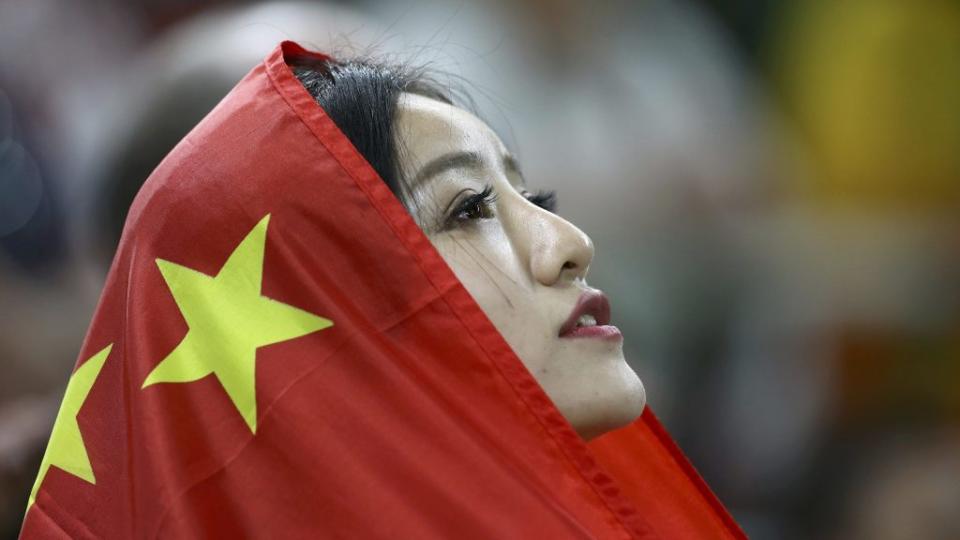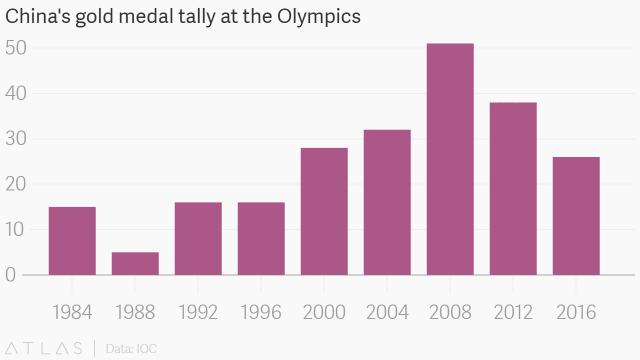China is totally over getting Olympic gold medals, says China

For China, winning Olympic gold medals is so 2012.
Team China ended up third in the Olympic medal table, finishing with the smallest gold medal haul in two decades. In 2008 China topped the rankings for the first time with 56 golds at its own games in Beijing. At London 2012, it ranked second only to the US with 38 golds.
China certainly had strong feelings about its underperformance. After Great Britain surpassed China to reach second place in the medal tally, the official news agency Xinhua wrote on Twitter: “You kidding me?” The tweet was later removed.
China’s poor performances in traditionally strong sports like gymnastics and badminton are to blame for the lower-than-expected medal tally. China collected only two bronzes in gymnastics this year, compared to five gold medals and 12 medals overall in 2012.

In response, Chinese state media has been trying to downplay the importance of winning. As the Rio games ended Sunday night, the state-backed nationalistic tabloid Global Times concluded in a commentary: “[T]he public has generally been unfazed since observers say the country, already the second largest economy in the world, no longer needs Olympic medals to boost morale.” Although the gold medal won by the women’s volleyball team is an apparent source of “national pride,” the tabloid noted, citing a sports professor, “charisma and individual performance are likewise valued.”
At #Rio Games, #China's new generation values charisma, fun as well as victory https://t.co/ebFeYwQZRr pic.twitter.com/WFNrlvkazc
— People's Daily,China (@PDChina) August 22, 2016
In fact, China’s state media had been trying to manage expectations from the start. In pursuit of the first gold medal of this year’s Olympic games, China’s veteran sport shooter Du Li ended up losing to the US’s Virginia Thrasher in the women’s 10-meter air rifle. One day later, Chinese swimmer Sun Yang finished second to Australia’s Mack Horton in the 400-meter freestyle swimming race, missing the chance to secure the first gold for China once again.
“The first gold of the Olympics: Are you really that important?” asked the Chinese Communist Party’s official mouthpiece People’s Daily (link in Chinese) in an article shared on social networking app WeChat. The answer was no, according to the newspaper: “Both Du Li and Sun Yang had brilliant smiles on the podiums. Their smiles show Chinese athletes’ confidence and calm. Perhaps that’s more important than gold medals in the upcoming journey.”
The piece set the tone for how the Olympics was to be covered by Chinese media in the days to follow. Public attention soon shifted from Chinese athletes’ performances to gossip outside the sports arena. State media demanded Horton apologize for calling Sun a “drug cheat,” and then asked Brazil to apologize for using the wrong Chinese flags on the podiums.
State media also started focusing on athletes’ personalities. Chief among those was swimmer Fu Yuanhui, who won hearts around the world with her funny facial expressions and straightforwardness. An unexpected marriage proposal during a medal ceremony in diving made headlines around the world, and photos of male swimmer Ning Zetao’s body swarmed social media.
Chinese people now interested less on medal table, more on the athletes and their stories #Rio2016 #Riotimehttps://t.co/vRrq546BuJ
— CCTVNEWS (@cctvnews) August 21, 2016
What #CHN women volleyball do on #Rio2016's shuttle bus can help you better understand the Olympic championshttps://t.co/p76tp4znjG
— Team China (@XHSports) August 21, 2016
But is China really getting over its gold-medal obsession? It can be hard to tell. During a Sunday (Aug. 21) press conference (link in Chinese), sports minister Liu Peng said that winning gold medals is not the only target, but it’s still essential for Chinese athletes to “glorify the country” with better performances. And judging by state media’s very excited reaction to the women’s volleyball gold medal win on the weekend, it seems that some gold medals still matter a great deal.


Sign up for the Quartz Daily Brief, our free daily newsletter with the world’s most important and interesting news.
More stories from Quartz:
